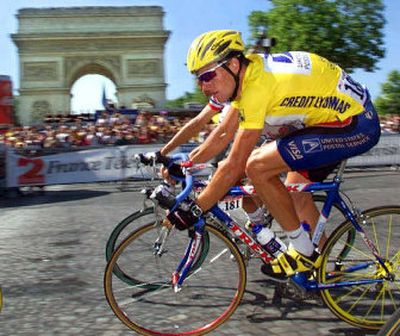Armstrong accused

PARIS – Faced with yet another report that he cheated his way to a Tour de France victory, Lance Armstrong responded Tuesday the same way he has since the doping whispers began during the first of his seven straight wins: “I never took performance-enhancing drugs.”
In a four-page article headlined “The Armstrong Lie,” the French sports daily L’Equipe printed copies of documents suggesting six urine samples he provided during his first championship in 1999 tested positive for the red blood cell-booster erythropoietin, or EPO.
The drug was on the list of banned substances at the time but there was no effective test to detect it.
Tour de France director Jean-Marie Leblanc said the report published appeared “credible” and meticulously researched, adding that Armstrong must have a chance to rebut the claims.
“We are very shocked, very troubled by the revelations we read this morning,” Leblanc told RTL radio.
Armstrong, a frequent target of L’Equipe, vehemently denied the allegations.
“Unfortunately, the witch hunt continues and tomorrow’s article is nothing short of tabloid journalism,” Armstrong wrote on his Web site. “I will simply restate what I have said many times: I have never taken performance-enhancing drugs.”
The allegations surfaced seven years later because EPO tests on the 1999 samples were carried out only last year – when scientists at a lab outside Paris used them for research to perfect EPO testing. The national anti-doping laboratory in Chatenay-Malabry said it promised to hand its finding to the World Anti-Doping Agency, provided they were never used to penalize riders.
L’Equipe’s investigation was based on urine B samples – the second of two samples used in doping tests. The A batch was used in 1999 for analysis at the time. Without those samples, any disciplinary action against Armstrong would be impossible, French Sports Minister Jean-Francois Lamour said.
The governing body of world cycling did not begin using a urine test for EPO until 2001, though it was banned in 1990. For years, it had been impossible to detect the drug, which builds endurance by boosting the production of oxygen-rich red blood cells.
Jacques de Ceaurriz, the head of France’s anti-doping laboratory, which developed the EPO urine test, told Europe-1 radio that at least 15 urine samples from the 1999 Tour had tested positive for EPO.
Separately, the lab said it could not confirm that the positive results were Armstrong’s. It noted that the samples were anonymous, bearing only a six-digit number to identify the rider, and could not be matched with the name of any one cyclist.
However, L’Equipe said it was able to make the match.
On one side of the page, it showed what it claimed were the results of EPO tests from anonymous riders used for lab research. On the other, it showed Armstrong’s medical certificates, signed by doctors and riders after doping tests – and bearing the same identifying number printed on the results.
“It will be very interesting to see what UCI does and what the U.S. Cycling Federation does and what Lance Armstrong has to say,” WADA chairman Dick Pound said. “If the evidence is seen as credible then, yes, he has an obligation to come forward and specifically give his comments, especially after his previous comments that he has never used drugs.
“If anything were found, we couldn’t do anything because we didn’t even exist in 1999. But it’s important that the truth must always be made clear,” Pound added.
Representatives for Armstrong said he was in Austin, Texas, where he lives and did not wish to comment beyond the Web site statement.
A year before Armstrong won his first Tour title, the race faced its worst doping scandal after police caught a Festina team employee with a stash of drugs. Riders were ejected and others quit, almost forcing the Tour to collapse.
Armstrong has been dogged by questions in the French media about how someone whose testicular cancer had spread to his lungs and brain could rise to the top of one of the world’s most grueling events.
Armstrong angrily appeared at a news conference that year to explain that trace amounts of cortisone found in his system were from a prescription skin cream to treat saddle sores.
The following year, Armstrong and his U.S. Postal Service team became the subject of a French investigation into whether they used banned substances during the 2000 race. The probe was closed in 2002 for lack of evidence.
L’Equipe, whose parent company is closely linked to the Tour, often questioned Armstrong’s clean record and frequently took jabs at him – portraying him as too arrogant, too corporate and too good to be real.
“Never to such an extent, probably, has the departure of a champion been welcomed with such widespread relief,” the paper wrote the day after Armstrong’s record seventh straight win.